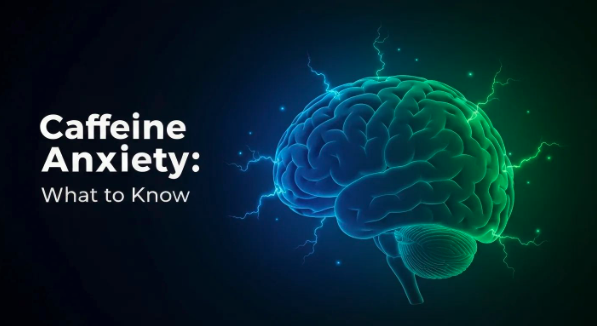Diets Effects on Anxiety Levels Revealed
Discover the connection between diet and anxiety levels to fuel your calm and boost mental well-being today!


Understanding Anxiety and Diet
Impact of Diet on Mental Well-being
Diet plays a significant role in mental well-being, influencing emotional health and stress levels. A review published in Neuroscience & Biobehavioral Reviews explores the connection between sugar consumption and stress-driven behaviors, suggesting that what one eats can have profound effects on mood and anxiety levels [1]. A diet high in refined sugars may lead to heightened anxiety and emotional instability, underlining the importance of dietary choices in managing anxiety.
Gut-Brain Connection and Anxiety
The gut-brain connection is a critical aspect of understanding anxiety. There exists a bidirectional link between gut health and mental well-being. Research indicates that both probiotics and a healthy diet can potentially improve symptoms of anxiety [2]. The gut microbiota—the trillions of microorganisms residing in the gastrointestinal tract—plays a vital role in regulating the immune system and influencing mental health.
Changes in gut microbiota can considerably impact anxiety, stress, and depression. For instance, inflammation in the gastrointestinal tract can lead to the release of cytokines and neurotransmitters, which correlates with increased symptoms of anxiety and depression. Studies suggest that diets rich in probiotics can help regulate gut microbiota, potentially alleviating anxiety symptoms and promoting better overall mental health [2].
Ongoing research aims to further explore the benefits of probiotics for treating anxiety and depression. Notably, about 95% of serotonin receptors are located in the gut lining, reinforcing the connection between gut health and emotional states. This emphasizes the potential for dietary interventions to aid in managing anxiety and improving mental health [3].
Understanding the relationship between diet and anxiety can offer valuable insights into managing chronic worry and developing effective strategies for reducing stress through lifestyle changes. By making informed dietary choices, individuals may strengthen their mental resilience and better cope with anxiety.

Diet and Gut Health
The relationship between diet and gut health plays a significant role in managing anxiety. Emerging research indicates that our gut microbiota, which consists of trillions of bacteria, fungi, and viruses residing in the gastrointestinal tract, can influence both mental health and emotional well-being.
Probiotics and Anxiety
Probiotics are beneficial microorganisms that contribute to gut health. A bidirectional relationship exists between a person’s gut and mental health, suggesting that probiotics and dietary choices could improve both anxiety and gut health. Incorporating probiotic-rich foods, such as yogurt, kefir, and fermented vegetables, into the diet can enhance gut microbiota composition.
Studies have shown that adding probiotics to the diet may help regulate gut microbiota, improve symptoms of stress and anxiety, and bolster overall mental health [2]. Ongoing research continues to explore the potential of probiotics in treating anxiety and depression, further highlighting their importance in achieving a balanced gut-brain connection.
Probiotic SourcesBenefitsYogurtEnhances gut health and improves moodKefirSupports immune function and anxiety reductionSauerkrautRich in beneficial bacteria, promotes digestion
Role of Microbiota in Mental Health
The composition of gut microbiota significantly affects mental health. Changes in the microbiota can impact mental health, stress, and depression [2]. Inflammation in the gastrointestinal tract can release cytokines and neurotransmitters, with increased levels of inflammatory cytokines directly correlating with symptoms of anxiety and depression [2].
The gut-brain axis indicates that about 95% of serotonin receptors are located in the lining of the gut. This connection underscores the importance of gut health in mood regulation and anxiety management [3]. A healthy diet, rich in fiber and low in processed foods, helps maintain a beneficial microbiota and can reduce the risk of anxiety and depression.
By understanding the connection between diet and gut health, individuals can make informed dietary choices to support their mental well-being. Emphasizing probiotic-rich foods and maintaining a healthy gut microbiota can be effective strategies for managing anxiety. For more resources on managing anxiety, visit our section on managing chronic worry.

Nutrients for Anxiety Management
A well-balanced diet can play a significant role in managing anxiety levels. Certain nutrients are particularly beneficial for reducing symptoms associated with anxiety. This section delves into some key nutrients that are linked to anxiety management and overall mental well-being.
Omega-3 Fatty Acids
Omega-3 fatty acids are essential fats found primarily in fatty fish such as salmon, mackerel, sardines, trout, and herring. These nutrients have been shown to help reduce anxiety symptoms. Current recommendations suggest consuming at least two servings of fatty fish per week for effective anxiety management.
Food SourceOmega-3 Content (g per 100g)Salmon2.3Mackerel2.6Sardines1.5Trout1.4Herring1.7
Vitamin D and Mood Regulation
Vitamin D is crucial for mood regulation and has been linked to mood disorders, including anxiety. Eggs, especially from pasture-raised hens, are an excellent source of Vitamin D. They also contain tryptophan, which helps produce serotonin, a neurotransmitter that regulates mood and anxiety levels [4].
Food SourceVitamin D Content (IU per 100g)Egg (whole)37Salmon570Fortified Milk100
Potassium and Zinc
Pumpkin seeds are an excellent source of both potassium and zinc. Research indicates that these minerals may help alleviate symptoms of stress and anxiety. Lower potassium and magnesium levels can lead to elevated levels of cortisol, a hormone associated with stress [4].
MineralRecommended Daily Intake (mg)Potassium2600 - 3400 (varies by age and gender)Zinc8 (women) / 11 (men)
Impact of Dark Chocolate
Dark chocolate, particularly varieties with 70% cacao or more, can positively affect anxiety levels due to its rich content of polyphenols, flavonoids, and magnesium. These compounds contribute to the production of serotonin, enhancing mood and reducing stress. Consumption of dark chocolate has been positively associated with decreased anxiety symptoms [4].
Chocolate TypeCacao PercentageMagnesium Content (mg per 100g)Dark Chocolate70%228Milk Chocolate30%60
Turmeric for Lowering Anxiety
Turmeric contains curcumin, a compound known for its potential to lower anxiety levels by reducing inflammation and oxidative stress associated with mood disorders. Studies have shown that curcumin intake can contribute to decreased anxiety and increased levels of DHA, an omega-3 fatty acid beneficial for mental health.
Food SourceCurcumin Content (g per 100g)Turmeric powder3.14
Incorporating these nutrients into the daily diet can help manage anxiety effectively. By understanding the connection between diet and anxiety levels, individuals can make informed dietary choices to support their mental health.
Dietary Factors Affecting Anxiety
Dietary choices play a significant role in influencing anxiety levels. Understanding how certain dietary factors affect mental health can help individuals manage their anxiety more effectively.
Sugar Consumption and Stress
Research indicates a strong relationship between sugar consumption and emotional well-being. A review published in Neuroscience & Biobehavioral Reviews suggests that diets high in sugar can exacerbate stress-driven, emotional, and addictive behaviors. This connection highlights the importance of moderation in sugar intake to promote better mental health.
Sugar Intake LevelPotential Effects on AnxietyLowReduced symptoms of anxietyModerateModerate stress levelsHighIncreased stress and emotional instability
Connection Between Inflammation and Anxiety
Inflammation is another key factor that influences anxiety. Studies have shown that inflammation in the gastrointestinal tract can release cytokines and neurotransmitters that affect mood. Increased levels of inflammatory cytokines have been linked directly to symptoms of both depression and anxiety. Therefore, managing inflammation through diet can be crucial for anxiety management.
Inflammatory LevelCorrelation with AnxietyLowLower anxiety symptomsModerateMild anxiety symptomsHighSignificant anxiety symptoms
Complex Carbohydrates and Blood Sugar Levels
Complex carbohydrates play an essential role in stabilizing blood sugar levels, which can alleviate feelings of jitteriness and anxiety. A diet rich in whole grains, vegetables, and fruits helps maintain even blood sugar levels, providing a more calming effect compared to simple carbohydrates found in processed foods. Skipping meals can lead to drops in blood sugar, potentially increasing anxiety symptoms, making regular meal consumption vital.
Carbohydrate TypeImpact on Blood Sugar LevelsSimple CarbohydratesQuick spikes and dropsComplex CarbohydratesStable blood sugar
Antioxidants and Anxiety Symptoms
Antioxidants have been recognized for their potential benefits in alleviating anxiety symptoms. Anxiety is believed to be linked with a lowered antioxidant state. Foods rich in antioxidants may help ease symptoms, making it beneficial to include them in the diet for anyone struggling with anxiety.
Antioxidant-Rich FoodsBenefits for AnxietyBerriesReduce oxidative stressLeafy GreensImprove moodNuts and SeedsSupport mental health
Integrating a healthy diet can make a significant difference in managing anxiety levels. Understanding the connection between diet and anxiety levels is crucial for creating a well-rounded approach to mental well-being. For additional insights on managing anxiety, consider exploring topics such as building resilience against anxiety and calming techniques for anxious moments.
Research Findings on Diet and Anxiety
Understanding the relationship between diet and anxiety is essential for managing anxiety levels effectively. Research highlights various dietary factors that may influence anxiety symptoms.
Dairy Consumption and Anxiety
The effects of dairy consumption on anxiety levels have been a subject of interest in recent studies. Among 19 studies evaluating this connection, results have been mixed. One prospective cohort study indicated no significant associations between dairy intake and anxiety levels. However, in cross-sectional studies, 7 reported a significantly lower risk of anxiety with increased dairy intake, while 12 studies showed no clear associations.
This ambiguity suggests that while dairy might benefit some individuals, it does not universally impact anxiety and further research is needed to clarify this connection.
Study TypeFindingsProspective Cohort StudyNo significant association between dairy intake and anxietyCross-Sectional Studies7 studies: lower anxiety risk with increased dairy intake; 12 studies: no significant relationship
Association between Diet and Anxiety Levels
There is growing evidence suggesting a clear link between overall dietary patterns and anxiety levels. Diets rich in complex carbohydrates, such as whole grains, fruits, and vegetables, are associated with lower anxiety symptoms. Conversely, diets high in added sugars and processed foods can lead to increased anxiety due to their impact on blood sugar levels and inflammation.
Additionally, studies indicate that high sugar intake is correlated with low-grade inflammation, which can adversely affect brain activity linked to anxiety disorders. The variation in protein intake also presents a potential area of concern, although more research is required to determine its precise effects on anxiety symptoms [7].
For better anxiety management, focusing on a balanced diet with a mix of nutrients, including antioxidants, omega-3 fatty acids, and vitamins, can foster mental well-being. More detailed strategies can be found in our article on managing chronic worry and tips on reducing stress through lifestyle changes.
Tips for Managing Anxiety through Diet
Understanding how dietary choices impact anxiety levels can help individuals develop strategies for managing their mental well-being. Here are some effective tips that highlight the connection between diet and anxiety levels.
Healthy Dietary Patterns
Opting for a diet filled with nutritious foods can significantly influence anxiety levels. Research suggests that a diet rich in whole grains, vegetables, and fruits is more favorable than one high in processed foods. Complex carbohydrates can help maintain a more even blood sugar level, creating a sense of calmness.
Food CategoryRecommended SourcesImpact on AnxietyWhole GrainsOats, quinoa, brown riceStabilizes blood sugar levels, reduces anxietyVegetablesSpinach, broccoli, carrotsPacked with vital nutrients and antioxidantsFruitsBerries, oranges, bananasHigh in vitamins and can lower anxiety symptoms
For additional insights into how diet affects anxiety, refer to managing chronic worry.
Impact of Prebiotic Compounds
Prebiotics are non-digestible food components that promote the growth of beneficial gut bacteria. These compounds are paramount for gut health, which is increasingly linked to mental health. Foods rich in prebiotics include bananas, onions, garlic, and leeks. They not only support a healthy gut microbiome but may also decrease levels of anxiety.
Prebiotic FoodHealth BenefitsBananasPromote good bacteria and improve digestive healthOnions & GarlicEnhance gut health and may help combat anxietyLeeksSupport overall mental well-being through improved gut function
For strategies on enhancing gut health, visit building resilience against anxiety.
Balanced Omega-3 Intake
Omega-3 fatty acids have been shown to have a positive effect on mood regulation. Including sources such as fatty fish (salmon, mackerel), walnuts, and flaxseeds in the diet can support mental health. These healthy fats can help reduce symptoms of anxiety and improve overall emotional regulation.
Omega-3 SourceRecommended ServingBenefits on AnxietyFatty Fish2 servings per weekProvides EPA and DHA, which can improve moodWalnutsA handful dailyRich in ALA; supports brain healthFlaxseeds1-2 tablespoons dailyHigh in Omega-3; may reduce anxiety symptoms
For more tips on effectively incorporating these nutrients into the diet, check out our article on reducing stress through lifestyle changes.
These dietary adjustments not only offer physical health benefits but also play a significant role in managing anxiety levels effectively. By choosing the right foods, individuals can create a supportive environment for their mental well-being.
References
[2]:
[3]:
[4]:
[5]:
[6]:
[7]:
More Resources
A team ready to start your journey.
Get in touch — today.
We are a safe space – a haven for exceptional individuals to receive discreet, personalized, in-person treatment and care.
.avif)

.webp)








